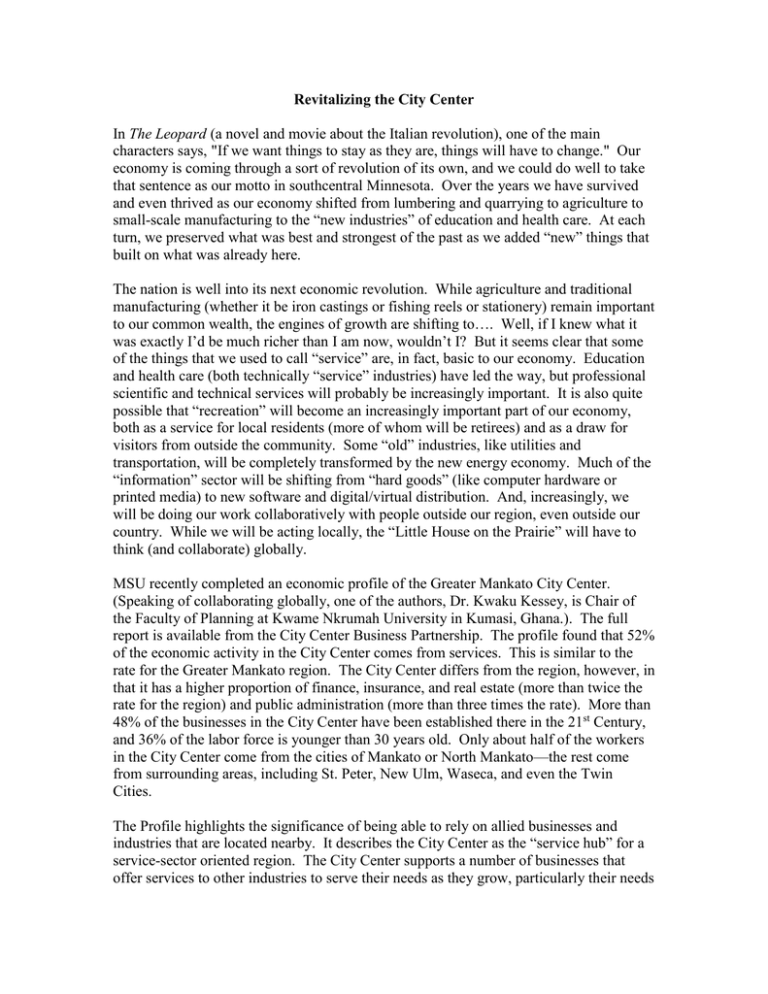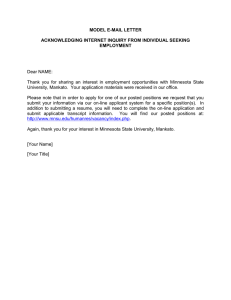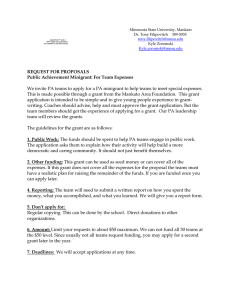Revitalizing the City Center The Leopard
advertisement

Revitalizing the City Center In The Leopard (a novel and movie about the Italian revolution), one of the main characters says, "If we want things to stay as they are, things will have to change." Our economy is coming through a sort of revolution of its own, and we could do well to take that sentence as our motto in southcentral Minnesota. Over the years we have survived and even thrived as our economy shifted from lumbering and quarrying to agriculture to small-scale manufacturing to the “new industries” of education and health care. At each turn, we preserved what was best and strongest of the past as we added “new” things that built on what was already here. The nation is well into its next economic revolution. While agriculture and traditional manufacturing (whether it be iron castings or fishing reels or stationery) remain important to our common wealth, the engines of growth are shifting to…. Well, if I knew what it was exactly I’d be much richer than I am now, wouldn’t I? But it seems clear that some of the things that we used to call “service” are, in fact, basic to our economy. Education and health care (both technically “service” industries) have led the way, but professional scientific and technical services will probably be increasingly important. It is also quite possible that “recreation” will become an increasingly important part of our economy, both as a service for local residents (more of whom will be retirees) and as a draw for visitors from outside the community. Some “old” industries, like utilities and transportation, will be completely transformed by the new energy economy. Much of the “information” sector will be shifting from “hard goods” (like computer hardware or printed media) to new software and digital/virtual distribution. And, increasingly, we will be doing our work collaboratively with people outside our region, even outside our country. While we will be acting locally, the “Little House on the Prairie” will have to think (and collaborate) globally. MSU recently completed an economic profile of the Greater Mankato City Center. (Speaking of collaborating globally, one of the authors, Dr. Kwaku Kessey, is Chair of the Faculty of Planning at Kwame Nkrumah University in Kumasi, Ghana.). The full report is available from the City Center Business Partnership. The profile found that 52% of the economic activity in the City Center comes from services. This is similar to the rate for the Greater Mankato region. The City Center differs from the region, however, in that it has a higher proportion of finance, insurance, and real estate (more than twice the rate for the region) and public administration (more than three times the rate). More than 48% of the businesses in the City Center have been established there in the 21st Century, and 36% of the labor force is younger than 30 years old. Only about half of the workers in the City Center come from the cities of Mankato or North Mankato—the rest come from surrounding areas, including St. Peter, New Ulm, Waseca, and even the Twin Cities. The Profile highlights the significance of being able to rely on allied businesses and industries that are located nearby. It describes the City Center as the “service hub” for a service-sector oriented region. The City Center supports a number of businesses that offer services to other industries to serve their needs as they grow, particularly their needs for specialized services. In other words, one of the basic economic activities of Greater Mankato is service—providing the underpinnings to support new ideas and new businesses as they start up and flourish. The relative youth of the labor force (thanks, in part, to the educational institutions) and of the businesses themselves (thanks, in part, to the young entrepreneurs) positions us to capitalize on emerging trends, whatever they will be. The reliance on labor from throughout the region is a measure of the regional scope and reach of the City Center. In The Creative Class, Richard Florida makes the case that the new economy will be created by a class of people who work with their brains more than their hands, are footloose (with the new communication technologies, they can do their work anywhere), and who play as hard as they work (quality of life is as important as the quality of work). Our educational institutions turn out a bumper crop of such people every year. If the future of our region rests on their energy, it will be important to provide an environment that captures their interest and encourages them to stay. The old distinction between basic and service sectors is breaking down. In the future, a successful basic economy will depend on the success of its service economy. Expenditures on the quality of our local life (the beauty and quality of the physical environment, the variety and richness of cultural and recreational opportunities, the strength of the community’s involvement in the common good) will also be investments in the capacity of our businesses. When Ben Franklin was leaving Carpenter’s Hall in Philadelphia after the ratification of the Constitution, he was asked what they had given the country and he replied, “A republic, if you can keep it.” We find ourselves in a good position economically, and poised to take advantage of whatever the new economy is becoming. If we can keep it. Tony Filipovitch Tony is Professor and Chair of the Urban & Regional Studies Institute at Minnesota State University, Mankato. He can be reached at (507) 389-5035 or tony@mnsu.edu


